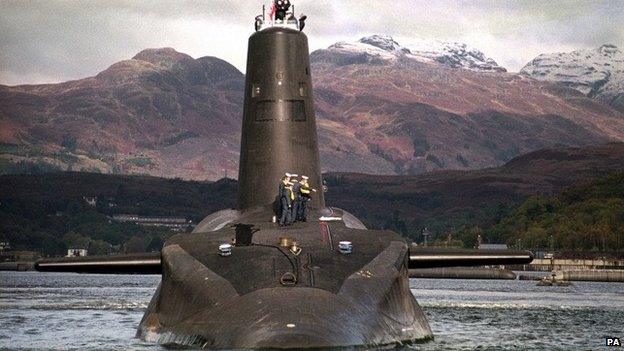Scottish independence: nuclear free promise for constitution
- Published

The UK's submarine-based nuclear deterrent is based at Faslane on the River Clyde
The removal of nuclear weapons from Scottish soil should be part of a post-independence constitution, according to Scotland's deputy first minister.
Nicola Sturgeon said a legal obligation to work for nuclear disarmament should be enshrined in the document.
It would place a duty on the Scottish government to work to remove submarine-based Trident nuclear weapons.
The MoD said the naval fleet at Faslane on the Clyde supported 8,000 jobs and there were no plans to move it.
The draft interim constitution, to be published for consultation shortly, will set out how an independent Scotland could prepare a written constitution.
It will also detail interim arrangements such as the role of government and the protection of human rights.
In a speech at Edinburgh University on Monday, Ms Sturgeon will argue that it should contain a constitutional commitment to remove all nuclear weapons from Scottish territory.
She said: "We believe nuclear weapons have no place in Scotland, and have made clear our intention to negotiate for the removal of Trident within the first parliamentary term of an independent Scotland.
'Permanent ban'
"Now, following consultation with the people of Scotland, these plans could be bound by constitutional law.
"Scottish taxpayers have been paying to have one of the largest concentrations of nuclear weapons in Europe on our doorsteps. It's high time that comes to an end.
"The people of Scotland now have the opportunity to remove Trident before we are hit with a share of the further £100bn in costs for a new generation of weapons of mass destruction on the Clyde.
"The Scottish government will also propose, for the permanent constitution, a constitutional prohibition on nuclear weapons being based in Scotland. This way they would never return."
A MoD spokesperson said there were no plans to move the Trident fleet from its Faslane base.
The spokesperson added: "From 2017 all of the Royal Navy's submarines will be based at Faslane, supporting 8,000 jobs.
"The defence secretary has previously said that any alternative solution would come at huge cost and take decades to replace.
"We are confident that the Scottish people will vote to remain part of the UK family which is the only way Scotland can be certain of its security, and benefit from the manpower, bases and military equipment that the union provides."